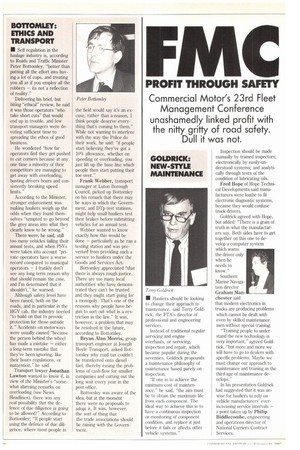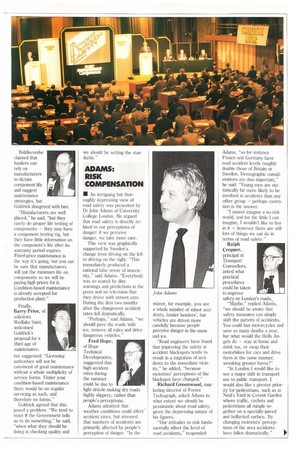MC
Page 28

Page 29

If you've noticed an error in this article please click here to report it so we can fix it.
PROFIT THROUGH SAFETY
Commercial Motor's 23rd Fleet Management Conference unashamedly linked profit with the nitty gritty of road safety. Dull it was not.
• Hauliers should be looking to change their approach to maintenance, said Terry Goldrick, the FTA's director of professional and engineering services.
Instead of traditional regular servicing and engine overhauls, or servicing, inspection and repair, which became popular during the seventies, Goldrick propounds a maintenance philosophy of maintenance based purely on inspection.
"If one is to achieve the minimum cost of maintenance," he said, ''the aim must be to obtain the maximum life from each component. The ideal way to achieve this is to have a continuous inspection or monitoring of component condition, and replace it just before it fails or affects other vehicle systems."
Inspection should be made manually by trained inspectors; electronically by easily-understood systems; and analytically through tests of the condition of lubricating oils.
Fred Hope of Hope Technical Developments said manufacturers were loathe to fit electronic diagnostic systems, because they would confuse truck drivers.
Goldrick agreed with Hope, but added: "There is a grain of truth in what the manufacturers say. Both sides have to get together on this one to develop a computer system which warns the driver only when he needs to know."
Southern Marine Navigation director Graham Manchester said that modern electronics in trucks are producing problems which cannot be dealt with even by skilled maintenance men without special training.
"Training people to understand the new technology is very important," agreed Goldrick, "but more and more we will have to go to dealers with specific problems. Maybe we must change our approach to maintenance and training as the third age of maintenance develops."
In his presentation Goldrick had suggested that it was unwise for hauliers to rely on vehicle manufacturers' everincreasing service intervals — a point taken up by Philip Biddlecombe, engineering and operations director of National Carriers Contract Services.
Biddlecombe claimed that hauliers can rely on manufacturers to dictate component life and suggest maintenance strategies, but Goldrick disagreed with him.
"Manufacturers are well placed," he said, "but they rarely do proper life testing of components — they may have a component testing rig, but they have little information on the component's life after its warranty period expires. Fixed-price maintenance is the way it's going, but you can be sure that manufacturers will put the minimum life on components so we will be paying high prices for it. Condition-based maintenance is already accepted for production plant."
Finally, Barry Prior, of solicitors Wedlake Saint, welcomed Goldrick's proposal for a third age of maintenance, but suggested: "Licensing authorities will not be convinced of good maintenance without a whole multiplicity of service forms. Under your condition-based maintenance there would be no regular servicing as such, and therefore no forms."
Goldrick agreed that this posed a problem. "We tend to react if the Government tells us to do something," he said, "when what they should be doing is checking quality and we should be setting the standards."




















































































